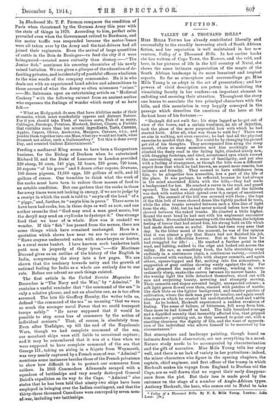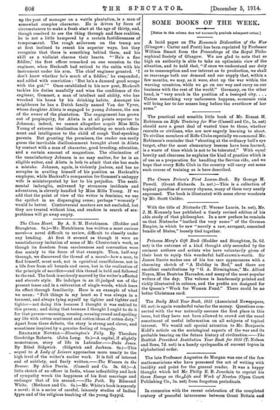FICTION.
VALLEY OF A THOUSAND HILLS.* MISS MILLS YOUNG has already contributed liberally and successfully to the steadily increasing stock of South African fiction, and her reputation is well maintained in her new venture, Valley of a Thousand Hills. In her earlier books she has written of Cape Town, the Karroo, and the veld, and here, in her pictures of life in the bill country of Natal, she shows the same intimate appreciation of the magic of the South African landscape in its more luxuriant and tropical aspects. So far as atmosphere and surroundings go, Miss Mills Young is an adept in the art of presentation ; and her powers of vivid description are potent in stimulating the visualizing faculty in her readers—an important element in enlisting and securing their attention. Throughout the story one learns to associate the two principal characters with the hills, and this association is very happily conveyed in the passage which describes the emotions of the hero at the darkest hour of his fortunes " Heckraft did not walk far ; his steps lagged as he got out of view of the house, and a certain weariness, an air of dejection, took the place of the more purposeful look with which he had started forth. After all, what was there to walk for? There was no aim in walking, not even exercise; he had had all the physical exercise he needed that day. Nor could he by changing his ground get rid of his thoughts. They accompanied him along the steep ascent, where so many memories met him mockingly as he climbed the dusty road in the failing light, climbed slowly now, with dragging footsteps, and tired, accustomed eyes which viewed the surrounding scene with a sense of familiarity, and yet also with a feeling of strangeness, as though the hills wore a different aspect from that which he had known, an aspect more remote; less intimate and friendly. They seemed to have withdrawn from him, to be altogether less accessible, less a part of the life of the place. It was perhaps, he reflected, because he had always in his mind atsociated Alieta with the hills,—they had made a background for her. He reached a curve in the road, and gazed upward. The land rose sharply above him, and all the hillside was dark with wattles which spread over it, a carpet of unrelieved green. The summit of the hill was crowned with them ; the tops of the thin belt of trees showed dense like tightly packed fir trees, while the slim trunks revealed between each a thin line of light from the sky. Odd, but he had never noticed before how the sky showed between the naked trunks. He climbed a little higher. Round the next bend he had met with his unpleasant encounter with Hantz. He recalled that meeting with the madman, the helpless feeling of terror that had seized him, his strong hold on life which had made death seem so awful. Death had been very near that day. In the bitter mood of the moment, be was of the opinion that it was almost a pity that Hants had not finished his job, and settled his difficulties forever. But at the time how he had struggled for life ! . . . He reached a further point in the road, and halting, walked to the edge and looked out across the valley. He saw, as something fresh, the hills stretching away endlessly in a continuous chain, a continuous variety,—rounded hills covered with verdure, hills with sharper summits, and again others, square-topped and flat, melting into the atmosphere, a suggestion of grey outline showing wanly against the sky. Far below gleamed the metals of the railway, winding in extra- ordinarily sharp, snake-like curves between its narrow banks. In the waning light the hills detached themselves, stood out with new and surprising beauty, arresting and strangely moving. Their summits and slopes revealed bright, unexpected colours ; a soft light green flowed over them, stained with patches of wattle- like dark blots on the lighter background, and smaller patches of cultivation, where the dark man grew his mealies, and again small clearings on which he erected his reed-thatched, mud and wattle hut. As be looked, Heckraft experienced a sudden revulsion of feeling. The sense of failure, of bitterness, fell away from him. Once more he had himself in hand. The hills breathed courage and a dignified serenity that insensibly affected him, that gripped him somehow ; pointing out, as they seemed to point out, with a startling clearness the dignity of life, and the want of apprecia- tion of the individual who allows himself to be mastered by hie circumstances."
But atmosphere and landscape painting, though based on intimate first-hand observation, are not everything in a novel. Nature study needs to be accompanied by characterization and the gift of narrative. Miss Mills Young tells her story well, and there is no lack of variety in her portraiture: indeed, the minor characters who figure in the opening chapters, the captain, chief engineer, and first officer of the tramp in which Heckraft makes his voyage from England to Durban raid the Cape, are so well drawn that we regret their early disappear- ance from the plot. But their loss is made good by the entrance on the stage of a number of Anglo-African types. Anthony Heckraft, the hero, who comes out to Natal to take • Vann of a Thousand Hills. By E. E. Mills Young. London: Joan Lane. [66.]
up the post of manager on a wattle plantation, is a man of somewhat complex character. He is driven by force of circumstances to make a fresh start at the age of thirty, and, though resolved to see the thing through and face realities, he is not a little hampered by a certain fastidiousness of temperament. The rough sailormen on the tramp are at first inclined to resent his superior ways, but they recognize that there is something behind them, and his
skill as a violinist charms their hearts. "' He's a fine fiddler,' the first officer remarked on one occasion to the engineer, when Heckraft had retired to the cabin with his instrument under his arm. The chief engineer grunted. don't know whether he's much of a fiddler,' he responded ; and added with conviction : ' But he's a damned good scrape with the gut.'" Once established in his new post, Heckraft tackles his duties manfully and wins the confidence of the engineer, Gommet, a man of intellect and ability, who has wrecked his home by his drinking habits. Amongst his neighbours he has a Dutch family named Van der ITyver, whose daughter Alieta is engaged to young Johnson, the son of the owner of the plantation. The engagement has grown out of propinquity, for Alieta is at all points superior to Johnson; indeed, we cannot altogether acquit Miss Mills Young of extreme idealization in attributing so much refine- ment and intelligence to the child of rough Taal-speaking parents. But granting the premisses, the reader can easily guess the inevitable disillusionment brought about in Alieta by contact with a man of character, good breeding, education, and a certain amount of magnetism. The elimination of the unsatisfactory Johnson is no easy matter, for he is an eligible suitor, and Alieta is loth to admit that she has made a mistake. Johnson, again, is violently jealous, and has no scruples in availing himself of his position as Heckraft's employer, while Heckraft's compassion for Gommers unhappy wife is misinterpreted by her to his prejudice. The senti- mental imbroglio, enlivened by strenuous incidents and adventures, is cleverly handled by Miss Mills Young. If we add that the point of view of the writer is feminine, we use the epithet in no disparaging sense; perhaps " womanly '' would be better. Controversial matters are not excluded, but they are treated without bias, and readers in search of sex- problems will go away empty.



























































 Previous page
Previous page